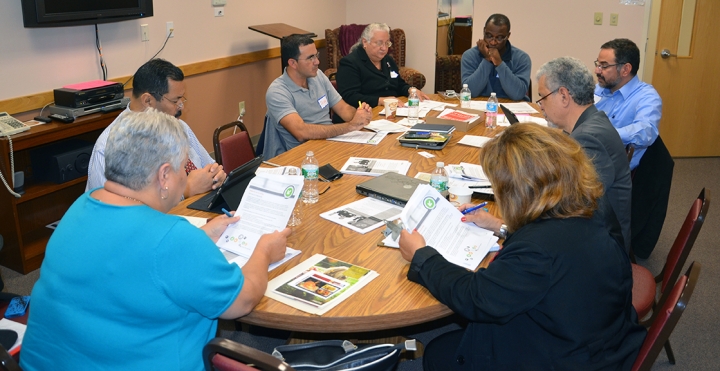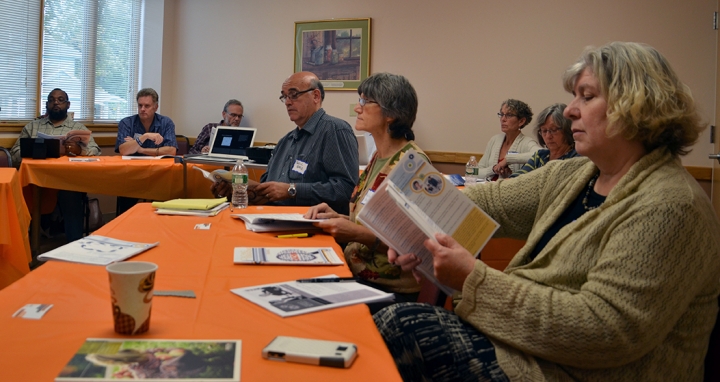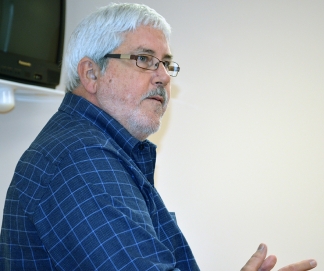news article


Conference hosts Path 1 coaching training
October 15, 2014 / By Beth DiCocco / .(JavaScript must be enabled to view this email address)
What do Pat Summit, Don Shula and your pastor have in common?
Well, the first two were coaches – and your pastor may be one as well.
Planting a new faith community or revitalizing an existing church requires many gifts and graces. While the planters, pastors and church leaders who are called to this ministry almost always have the strengths and experiences they need, they may not always realize it or know how to take the next step forward.
That's where coaching comes in.
"A coach can bring out the strengths and knowledge that are already there in a person and help them discover what's already there," said the Rev. Dave Masland, Director of New Faith Communities. "A coach tries to develop a relationship based on the goals of the person they are coaching."
Coaching conversations, he said, are focused on remembering the goal, finding out what the next step is to reach it and determining how you will know that you've done it.
In 2012, the Conference set a goal of establishing 100 new faith communities and revitalizing 300 churches by 2016.
In order to help those called to this work be successful, the Conference's Coaching Network Team – which includes Rev. Masland and the Rev. Aaron Bouwens, Director of Vital Congregations – is providing resources and training around how to be a coach.
A coach is different from a counselor, mentor or consultant, Rev. Masland said. He described coaching as: "action oriented, goal driven and very much about mutual accountability."
In early October 2014, the team, in conjunction with Path 1, the denomination's church-planting movement, offered Basic Training for Coaches:1.org/" or, mentor or consultant, . Leading the training was the Rev. Phil Maynard, Path 1 Coaching Network Director.
Twenty-two people attended the training; 16 from Upper New York, five from around the Northeastern Jurisdiction, and one Presbyterian pastor and coach who is coaching an Upper New York church planter. The classes were conducted in English and Spanish.
"One of the goals is to develop a network of people who are trained and certified in coaching so they can coach planters and church leaders who are trying to follow the Hand to Plow work and lead change and growth in a church they are trying to turn around," Rev. Phil Maynard Rev. Masland said.
Rev. Masland said.
In a session on Oct. 7, Rev. Maynard used the word coach as an acronym to describe what it means to be a coach:
Coming alongside
Observing
Asking powerful questions
Considering options
Holding accountable
The Rev. Pamela Klotzbach, pastor at the Batavia First UMC, has taken the Path 1 training, and is a member of the UNY Coaching Network Team. She is coaching a new faith community called Umtoo as well, and talked about what she'd like to see people take away from this training.
"I hope that they get excited about being the impetus, the push, behind some of the new church planters," she said. "Planters can get discouraged and overwhelmed. But within them, they do have the answers; that's the coach's role: to poke at them until they come up with the thing they knew all along. It's finding the expert inside of them."
Rev. Masland talked about what motivates people to become coaches: "A lot of us have had a good coach and seen the difference it has made in our life, and want to offer that to others," he said. "Also, there's some people who just enjoy having that role in people's lives.”
The Rev. Dr. Wilfredo Baez, pastor at the Tabernacle UMC in Binghamton, said he's not sure if he will pursue certification as a coach, but wants to learn the skills.
"It's good to be able to see some sort of organized way of going about coaching," said Rev. Baez, who said that it may help him to fulfill the role of coach, even if it's in an unofficial capacity. "It's good to see what other people are doing – what the field of coaching is – to get that context ... the skill set is more important than anything."
Those skills, he said, can help church leaders realize "what capacities we already have and when (we) need to have resources from outside to support us."
This training is just one of the opportunities the Conference plans to offer going forward.
"The vision that I have is for every coach – throughout their life – to have opportunities for practicing coaching and continuing to develop their skills," Rev. Masland said.
To learn more about planting new faith communities in Upper New York, visit the New Faith Communities website or the UNY NFC Facebook page.